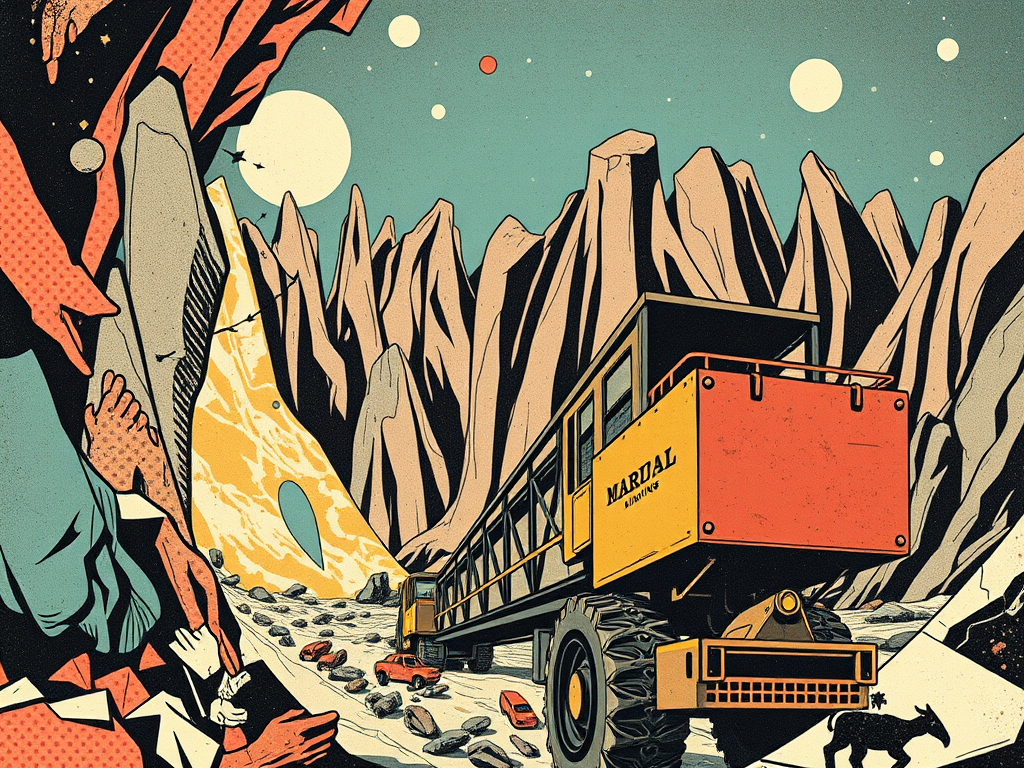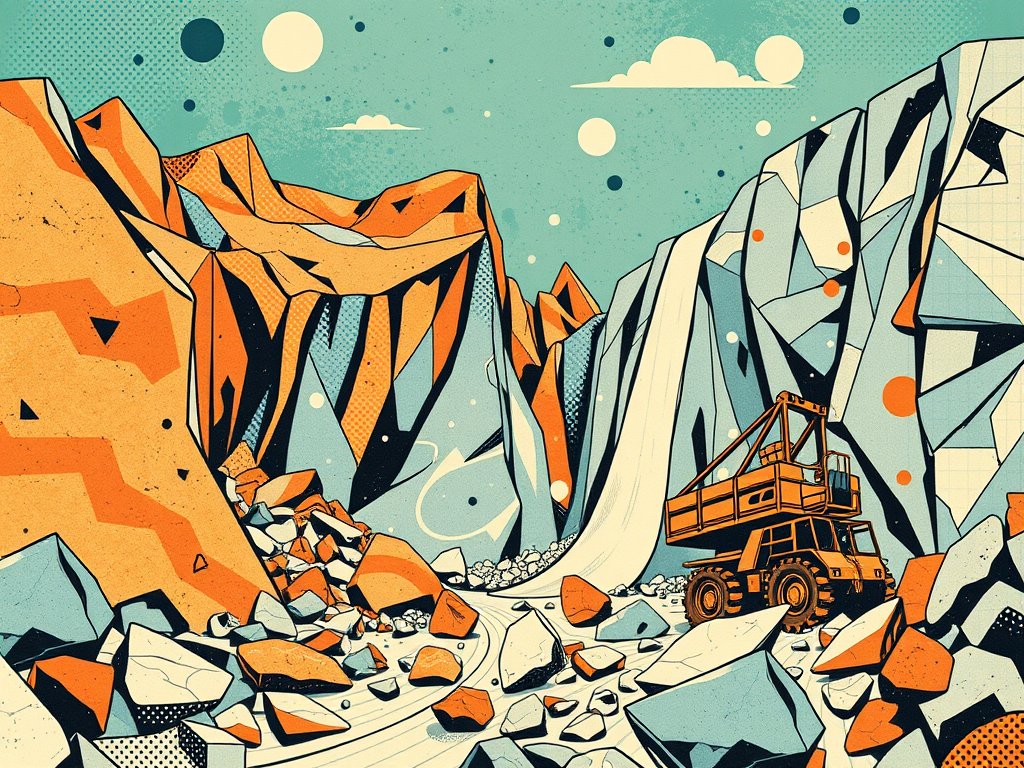
Mining and Minerals: Opportunities in Greece’s Marble, Gold, and Bauxite Industries
Reading time: 15 minutes
Table of Contents
- Introduction to Greece’s Mining Sector
- Historical Context of Mining in Greece
- Key Mineral Resources
- Current State of the Greek Mining Industry
- Investment Opportunities and Challenges
- Environmental and Social Considerations
- Future Outlook and Trends
- Conclusion
- FAQs
1. Introduction to Greece’s Mining Sector
Greece, a country renowned for its rich history and stunning landscapes, is also home to a diverse and potentially lucrative mining sector. With a geological profile that has blessed the nation with an abundance of mineral resources, Greece stands at the crossroads of tradition and opportunity in the global mining industry. This comprehensive analysis delves into the intricacies of Greece’s mining sector, focusing on its primary resources: marble, gold, and bauxite.
As we navigate through the complexities of this industry, it’s crucial to understand that the mining sector in Greece is not just about extraction and exports. It’s an integral part of the country’s economic fabric, intertwining with its cultural heritage, environmental concerns, and future economic strategies. The sector’s potential for growth and its challenges mirror the broader economic narrative of Greece – a story of resilience, adaptation, and the pursuit of sustainable development.
2. Historical Context of Mining in Greece
The history of mining in Greece is as old as its civilization. Ancient Greeks were pioneers in mineral extraction and metallurgy, with evidence of mining activities dating back to 1000 BCE. The famous silver mines of Laurium near Athens played a crucial role in funding the Athenian navy and, by extension, the golden age of Classical Greece.
Throughout the centuries, mining continued to be a significant economic activity in various regions of Greece. The Romans expanded on Greek mining techniques, and later, during the Byzantine and Ottoman periods, mining remained an important, albeit fluctuating, part of the local economy.
In the modern era, particularly post-World War II, Greece saw a resurgence in its mining sector. The discovery of significant bauxite deposits in the 1960s and increased marble extraction contributed to the country’s industrial development. However, the sector has faced challenges in recent decades, including economic crises, regulatory hurdles, and environmental concerns.
3. Key Mineral Resources
3.1 Marble
Greece is synonymous with high-quality marble, a reputation built over millennia. The country is one of the world’s leading producers of marble, with varieties like Pentelic marble (used in the Parthenon) and Parian marble being globally renowned.
Key facts about Greek marble:
- Greece ranks third globally in marble export value
- Major quarrying regions include Drama, Kavala, and the Peloponnese
- Greek marble is exported to over 120 countries
- The sector employs approximately 6,500 people directly
The marble industry has shown resilience even during economic downturns, with exports continuing to grow. This sector not only contributes significantly to Greece’s GDP but also plays a crucial role in regional development and employment.
3.2 Gold
Gold mining in Greece has a long and storied history, with modern operations centered in the Halkidiki peninsula and Thrace. The Skouries and Olympias mines in Halkidiki are among the largest gold projects in Europe.
Key points about Greek gold mining:
- Estimated reserves of over 16 million ounces
- Potential to make Greece a top gold producer in the EU
- Significant foreign investment, particularly from Canadian companies
- Controversial due to environmental concerns and local opposition
The gold mining sector in Greece represents a significant economic opportunity but faces challenges in balancing economic benefits with environmental and social concerns.
3.3 Bauxite
Bauxite, the primary ore of aluminum, is another crucial mineral resource in Greece. The country is the largest bauxite producer in the European Union and a significant player in the global market.
Important aspects of Greek bauxite mining:
- Major deposits located in central Greece, particularly around Parnassus-Giona
- Annual production of approximately 2 million tonnes
- Integrated industry with local alumina and aluminum production
- Significant contributor to Greece’s export earnings
The bauxite industry in Greece has been a steady contributor to the economy, providing both direct employment and supporting downstream industries.
4. Current State of the Greek Mining Industry
The Greek mining industry today is a blend of traditional practices and modern technologies, facing both opportunities and challenges. The sector contributes approximately 3-5% to the country’s GDP, a figure that has potential for growth.
Key indicators of the current state:
- Total annual mineral production value: €1.8 billion (2020)
- Direct employment: 15,000 jobs
- Indirect employment: 80,000 jobs
- Export orientation: Over 65% of production is exported
The industry has shown resilience in the face of economic challenges, with exports remaining strong even during periods of domestic economic contraction. However, it faces pressures from environmental regulations, community opposition to new projects, and the need for technological upgrades.
5. Investment Opportunities and Challenges
Greece’s mining sector presents a mix of established operations and untapped potential, creating a landscape ripe for investment. However, potential investors must navigate a complex environment of opportunities and challenges.
5.1 Opportunities
- Unexploited mineral reserves, particularly in gold and rare earth elements
- Government initiatives to streamline licensing processes
- Potential for technological innovation in extraction and processing
- Strategic location for exports to European and Middle Eastern markets
- Skilled workforce with a long tradition in mining
5.2 Challenges
- Complex regulatory environment and bureaucratic hurdles
- Environmental concerns and local community opposition to new projects
- Need for significant capital investment in aging infrastructure
- Fluctuating global commodity prices affecting profitability
- Competition from lower-cost producers in other countries
Investors in the Greek mining sector need to conduct thorough due diligence and engage proactively with local communities and government authorities. The potential rewards are significant, but so are the risks and challenges.
6. Environmental and Social Considerations
The mining industry in Greece, like elsewhere, faces increasing scrutiny regarding its environmental and social impacts. Balancing economic benefits with environmental protection and community welfare is crucial for the sector’s sustainable development.
6.1 Environmental Concerns
- Water usage and potential contamination, particularly in gold mining
- Deforestation and landscape alteration in marble quarrying
- Dust and air quality issues in bauxite mining areas
- Rehabilitation of exhausted mines and quarries
6.2 Social Impacts
- Employment opportunities in economically depressed regions
- Community displacement and changes in local economic structures
- Cultural heritage concerns, especially in areas with archaeological significance
- Health and safety of workers and nearby communities
Addressing these concerns requires a multi-stakeholder approach involving mining companies, local communities, environmental organizations, and government bodies. Sustainable mining practices and transparent community engagement are becoming increasingly important for project success.
7. Future Outlook and Trends
The future of Greece’s mining sector is poised at an interesting juncture, influenced by global trends, technological advancements, and shifting economic priorities. Several key trends are likely to shape the industry’s trajectory:
- Technological Innovation: Adoption of AI, automation, and big data analytics in mining operations to improve efficiency and reduce environmental impact.
- Sustainable Mining Practices: Increased focus on environmentally friendly extraction methods and comprehensive mine rehabilitation plans.
- Diversification: Exploration of new mineral resources, including rare earth elements crucial for green technologies.
- Global Market Dynamics: Fluctuations in global demand, particularly from emerging economies, affecting export potentials.
- Regulatory Evolution: Potential changes in mining laws to balance economic growth with environmental protection.
The Greek government’s stance on mining will be crucial. Recent policy directions suggest a more favorable environment for responsible mining investments, potentially unlocking new projects and revitalizing existing ones.
In the marble sector, there’s a growing trend towards value-added products rather than raw material exports. This shift could lead to increased domestic processing and higher export values.
For gold mining, the resolution of ongoing environmental disputes and the successful implementation of state-of-the-art mining technologies could position Greece as a significant gold producer in Europe.
The bauxite industry is likely to focus on efficiency improvements and exploring deeper deposits as surface mines become exhausted. Integration with Greece’s aluminum industry will remain a key strength.
Overall, the future of Greece’s mining sector appears cautiously optimistic, contingent on balancing economic opportunities with environmental stewardship and community engagement.
8. Conclusion
Greece’s mining and minerals sector, steeped in history yet poised for modernization, presents a complex tapestry of opportunities and challenges. The country’s rich deposits of marble, gold, and bauxite offer significant economic potential, capable of contributing substantially to GDP growth, export earnings, and employment.
However, the path forward is not without obstacles. Environmental concerns, regulatory complexities, and the need for substantial investments in technology and infrastructure are significant hurdles that must be addressed. The industry’s future success will hinge on its ability to adopt sustainable practices, engage positively with local communities, and navigate the global commodities market.
For investors and industry stakeholders, Greece’s mining sector offers a unique proposition. It combines the allure of untapped resources with the stability of an EU member state and the potential for technological innovation. As Greece continues to recover from past economic challenges, the mining sector could play a pivotal role in its economic renaissance.
The key to unlocking this potential lies in fostering a balanced approach – one that respects Greece’s natural heritage and local communities while harnessing its mineral wealth for economic development. With thoughtful policies, responsible corporate practices, and innovative solutions, Greece’s mining industry can aspire to be a model of sustainable resource extraction in the 21st century.
As Greece looks to diversify its economy and attract foreign investment, the mining sector stands as a testament to the country’s enduring resources and adaptability. Whether it’s the timeless beauty of Greek marble, the promise of gold, or the industrial importance of bauxite, these minerals continue to shape Greece’s economic narrative, bridging its storied past with a promising future.
For those interested in exploring investment opportunities beyond the mining sector, property for sale greece offers another avenue to participate in Greece’s economic growth and scenic beauty.
9. FAQs
Q1: What are the main challenges facing Greece’s mining industry?
A1: The main challenges include environmental concerns, complex regulations, community opposition to new projects, the need for technological upgrades, and competition from lower-cost producers in other countries.
Q2: How significant is marble production in Greece’s economy?
A2: Marble production is highly significant, with Greece ranking third globally in marble export value. The sector employs thousands directly and indirectly, contributing substantially to GDP and export earnings.
Q3: What is the current status of gold mining in Greece?
A3: Gold mining in Greece is centered in the Halkidiki peninsula and Thrace, with significant reserves. However, it faces environmental controversies and local opposition. If developed fully, it could make Greece a top gold producer in the EU.
Q4: How is Greece addressing environmental concerns in mining?
A4: Greece is addressing environmental concerns through stricter regulations, encouraging sustainable mining practices, and requiring comprehensive environmental impact assessments and rehabilitation plans for mining projects.
Q5: What opportunities exist for foreign investment in Greece’s mining sector?
A5: Opportunities include unexploited mineral reserves, potential for technological innovation, and government initiatives to streamline licensing processes. However, investors must navigate complex regulations and community engagement challenges.

Article reviewed by Alexandros Ioannidis, Senior Wealth Manager | Multi-Asset Portfolio Specialist | Building Customized Investment Solutions for High-Net-Worth Clients, on April 2, 2025
